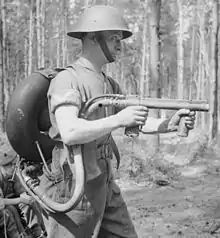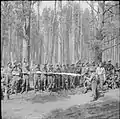Flamethrower, Portable, No 2
The Flamethrower, Portable, No 2 (nicknamed Lifebuoy from the shape of its fuel tank), also known as the Ack Pack, was a British design of flamethrower for infantry use in the Second World War.
| Flamethrower, Portable, No 2 | |
|---|---|
 A soldier of the King's Own Scottish Borderers demonstrates the Lifebuoy flamethrower, Denmead, Hampshire, 29 April 1944. | |
| Type | Flamethrower |
| Place of origin | United Kingdom |
| Service history | |
| Used by | British Army, Canadian Forces |
| Wars | Second World War |
| Production history | |
| Produced | 1943–1944 |
| No. built | 7,000 |
| Specifications | |
| Mass | 64 lb (29 kg) |
| Action | cordite igniter |
| Rate of fire | 10 igniters only |
| Maximum firing range | 120 ft |
Description
It was a near copy of the German Wechselapparat ("Wex") from 1917.
The Mark 1 was used as a training weapon, while the improved Mark 2 was used in action. Over 7,000 units were produced from 1943 to 1944. They were ready for service during Operation Overlord (the Allied invasion of Normandy).
The Ack Pack was a harness carrying a doughnut-shaped fuel container with a capacity of 4 Imperial gallons (18 litres) of fuel on the operator's back. In the middle of the "doughnut" was a spherical container holding nitrogen gas as a propellant, which was pressurized to 2,000 lbf/in² (140 Bar). This was sufficient to propel the burning fuel 120 feet (36 metres). A hose from the fuel tank passed to the nozzle assembly which had two pistol grips to hold and aim the spray. The back grip had the trigger.
In some versions the nozzle was fitted with a 10-chambered cylinder which contained the ignition cartridges. These could be fired once, each giving the operator 10 bursts of flame. In practice this gave 10 one-second bursts. It was also possible to spray fuel without igniting it to ensure there was plenty splashed around the target, then fire an ignited burst to light up the whole lot.
At some 64 pounds (29 kg) the flamethrower was considered heavy.
Pictures
 The Lifebuoy man-portable flamethrower being demonstrated to men of 1st Battalion, King's Own Scottish Borderers, Denmead, Hampshire, 29 April 1944.
The Lifebuoy man-portable flamethrower being demonstrated to men of 1st Battalion, King's Own Scottish Borderers, Denmead, Hampshire, 29 April 1944. A Flamethrower Portable, No 2 in the Israel Defense Forces History Museum, Tel Aviv, Israel (September 2015)
A Flamethrower Portable, No 2 in the Israel Defense Forces History Museum, Tel Aviv, Israel (September 2015) A Life Buoy flamethrower in action. August 1944.
A Life Buoy flamethrower in action. August 1944.
See also
References
- Bishop, Chris (2002). The Encyclopedia of Weapons of World War II: The Comprehensive Guide to Over 1,500 Weapons Systems, Including Tanks, Small Arms, Warplanes, Artillery, Ships and Submarines. Sterling Publishing Company, Inc. ISBN 978-1-58663-762-0.
External links
| Wikimedia Commons has media related to Flamethrower, Portable, No 2. |